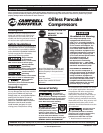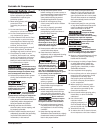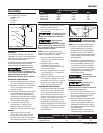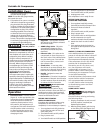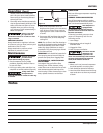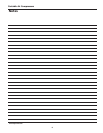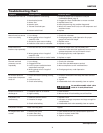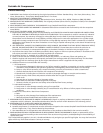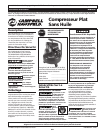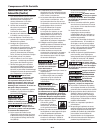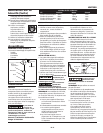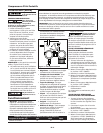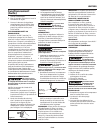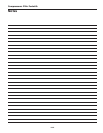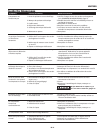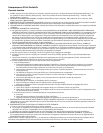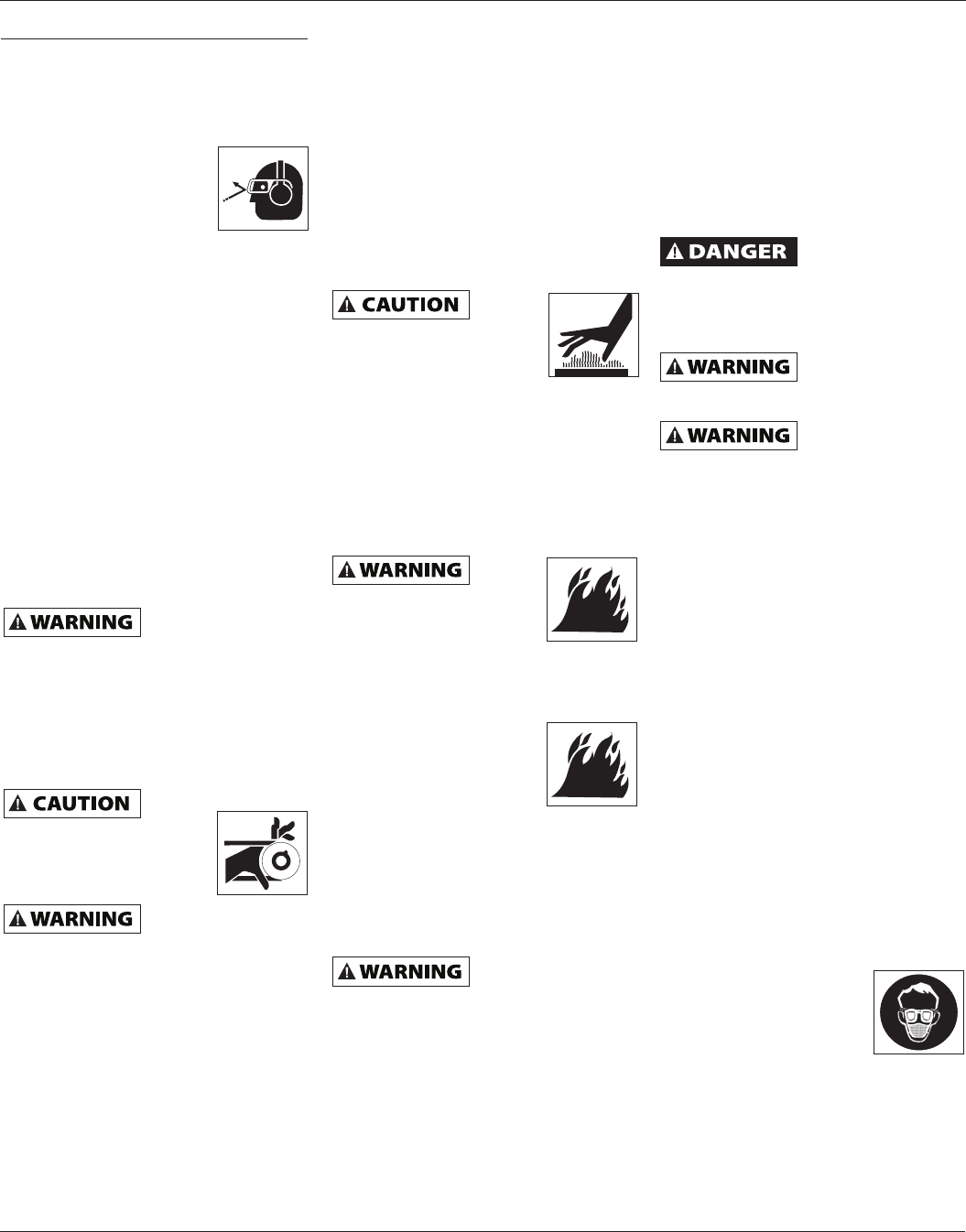
Portable Air Compressors
2
each component carefully,
before attempting to assemble,
disassemble or operate your
particular system.
2. Wear safety glasses and use hearing
protection when
operating the pump or
unit.
3. Do not stand on or use
the pump or unit as a handhold.
4. Do not exceed pressure rating of
any component in system.
5. Protect material lines and air lines
from damage or puncture. Keep
hose and power cable away from
sharp objects, chemical spills, oil,
solvents, and wet floors.
6. Never point a spray gun at oneself
or any other person. Accidental
discharge may result in serious injury.
7. Check hoses for weak or worn
condition, before each use, making
certain all connections are secure;
do not use if deficiency is found.
Notify an authorized service facility
for examination or repair.
Do not run
unattended. Leaving
compressor in AUTO position may allow it
to turn on inadvertently. To prevent this
and possible damage from power surge,
turn to OFF position after each use.
8. Release all pressures within system
slowly; dust and debris may be
harmful.
Keep
fingers
away from a running
compressor; fast moving
and hot parts will cause
injury and/or burns.
Disconnect power
and depressurize
system before servicing air compressor!
9. Follow all local electrical and safety
codes, as well as the National Electrical
Code (NEC) and the Occupational
Safety and Health Act (OSHA).
10. Wiring and fuses should follow
electrical codes, current capacity, and
be properly grounded.
11. Electric motors must be securely and
adequately grounded. See grounding
instructions and extension cord
information, in this manual.
12. Always disconnect power source
before working on or near a motor, or
its connected load. If power disconnect
point is out-of-sight, lock it in the
open position and tag to prevent
unexpected application of power.
13. Guard all moving parts; keep
visitors away. Never allow children
in work area.
14. Use only a properly grounded
outlet that will accept a three
pronged plug, and wear shoes to
prevent shock hazards.
Be
careful
when touching exterior of
operating motor; it may be
hot enough to cause injury.
Compressor parts may be hot
even if the unit is stopped.
15. Protect power cable from coming in
contact with sharp objects.
16. Clean electrical or electronic
equipment with an approved cleaning
agent, such as dry, nonflammable
cleaning solvent.
Motors,
electrical
equipment and controls can
cause electrical arcs that
will ignite a flammable gas
or vapor. Never operate or repair the
unit near a flammable gas or vapor.
Never store flammable liquids or gases
in the vicinity of the compressor.
17. To reduce fire hazard,
keep engine/motor
exterior free of oil,
solvent, or grease.
18. To avoid spontaneous combustion,
discard waste rags into approved
metal waste cans.
19. NEVER reset safety valve or pressure
switch. Keep safety valve free from
paint and other accumulations. This
provides safety against over pressure.
Never remove or
attempt to adjust
safety valve. Keep safety valve free
from paint and other accumulations.
20. Do regular maintenance; keep all
nuts, bolts, and screws tight, to be
sure equipment is in safe working
condition .
21. Keep cleaning rags and other
flammable waste materials in a tightly
closed metal container and dispose of
later in the proper fashion.
22. Drain tanks of moisture after each
day’s use. If unit will not be used for
a while, it is best to leave drain cock
open until such time as it is to be used.
This will allow moisture to completely
drain out and help prevent corrosion
of inside of tank.
23. Inspect tank yearly for rust, pin holes
or any other imperfections that could
cause it to become unsafe. NEVER
weld or drill holes in air tank.
Never attempt
to repair or modify
a tank! Welding, drilling or any other
modification will weaken the tank resulting
in damage from rupture or explosion.
Always replace worn or damaged tanks.
Drain liquid from
tank daily.
SPRAYING PRECAUTIONS
Do not spray
flammable materials
in vicinity of open flame or near ignition
sources including the compressor unit.
24. Spray in a well ventilated area, to keep
fumes from collecting and causing
health and fire hazards.
25. Do not spray in vicinity of open flames
or other places where a spark can
cause ignition. Do not smoke when
spraying paint, insecticides, or other
flammable substances.
26. Use a respirator when spraying.
27. Do not direct paint or other sprayed
material at the compressor. Locate
compressor as far away from
the spraying area as possible to
minimize overspray accumulation
on the compressor.
28. When spraying or cleaning with
solvents or toxic chemicals, follow
the instructions provided by the
chemical manufacturer.
29. Do not smoke when spraying paint,
insecticides, or other flammable
substances.
30. Use a face mask/
respirator when
spraying and spray in a
well ventilated area to
prevent health and fire hazards.
31. Household use only.
32. To reduce the risk of electrical shock,
do not expose to rain. Store indoors.
www.chpower.com
General Safety (Cont.)



